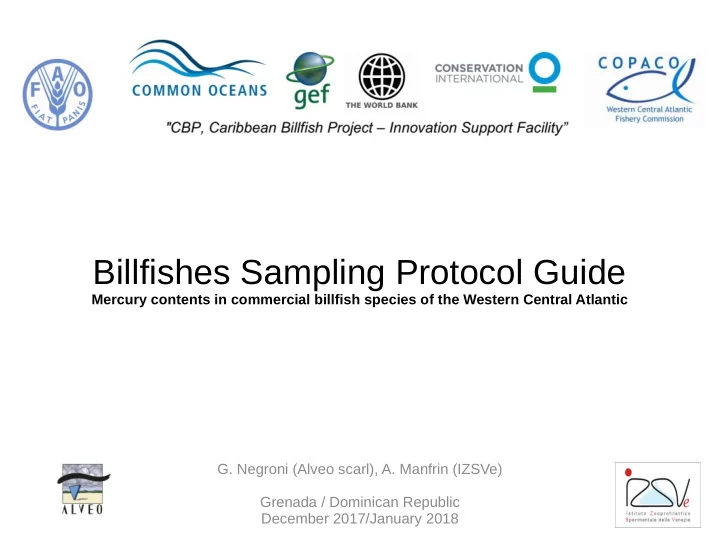

Billfishes Sampling Protocol Guide Mercury contents in commercial billfish species of the Western Central Atlantic G. Negroni (Alveo scarl), A. Manfrin (IZSVe) Grenada / Dominican Republic December 2017/January 2018
Caribbean
Aim of the Caribbean Billfish Project • Generating value and conservation outcomes through innovative management. • Strengthening regional billfish management and conservation planning. • A functional and responsive Consortium on Billfish Management and Conservation. • Develop business plans for one or more long-term pilot projects aimed at sustainable management and conservation of billfish within the Western Central Atlantic Ocean.
Key points of the project (1) Mercury contents in commercial billfish species of the Western Central Atlantic Sampling • Field guidance to operators ( samplers ). • Appropriate scientific billfish samples collection . • Submission to IZSVe*- Italy chemistry laboratory accredited to international standards (ISO 17025) for mercury analysis. * Istituto Zooprofilattico Sperimentale delle Venezie - Italy
Key points of the project (2) Mercury contents in commercial billfish species of the Western Central Atlantic Risk assesment • Laboratory and semi-structured interviews results will be analysized. • The public health analysis will be designed and conducted by experienced individuals so that the data is accurate and not skewed. • The potential health threats associated with regular billfish consumption will be evaluated.
Key points of the project (3) Mercury contents in commercial billfish species of the Western Central Atlantic Communication • Communication and related visibility is a key issue for this mission as the private and public stakeholders must actively play their roles in order to ensure that they will benefit of the mission result in the future.
Sampling protocol The sampling of fish for total mercury analysis needs some specific precautions: • avoid contamination or losses during handling and storage before transport to the laboratory; • during handling, storage and transport sample integrity and traceability must be maintained. • The cold chain (frozen samples) must be respected
Sample Submission Form (SSF) • Each sample must be accompained by the Sample Submission Form (see next slide) • An electronic picture/copy must be submitted to the IZSVe laboratory (manfrin@izsvenezie.it) • Data collection and validation are quite important Samples judged unacceptable upon arrival to the chemistry laboratory (improperly preserved, packaged or stored), will not be processed
Sample Submission Form (SSF) to be completed with all available data
Additional information (for fishermen or fish processing factory or collection point) Questions for fishermen (Fish processing factory) 1. Could you roughly estimate your monthly fish caught expressed as ton.? …….. 2. Could you indicate, on a percentage basis, to whom you sell it? Restaurants %...... Fish shops/Stores %...... Exporters/wholesalers %...... Local consumers %...... Tourist %...... Other (Please specify……………………….) %...... I can’t reply 3. Do you usually consume the billfish you catch? Yes (go to the Questionnaire about billfish consumption) No
Who, where and how many samples will be collected • Trained specialist will collect the billfish tissue sample. • In Grenada the samples will be collected at Grand Mal Jetty, Fisheries Market Complex and other landing sites . • A total of 120 samples will be collected = 40 x 3 different species.
Period and targeted species (December 2017/January 2018) • Blue marlin ( Makaira nigricans ), • White marlin ( Kajikia albida ), • Atlantic sailfish ( Istiophorus platypterus ). Period of catching for three main species of Billfish in Dominican Republic and Grenada Legend regarding the fishing abundance of the three species G = Great , F = Fair, R = Right, E = Empty
Sampling equipment
Minimum Sampling Equipment • Personal Protective Equipment (PPE): oilskins/ waterproof jacket, plastic boots, gloves, protective glasses, … • Fish sampling kit (scissors, knife, carbon steel surgical blade, medical surgery pliers, saw, balance, meter and any other cutting material available). • Polypropylene bags/vials, with label. • Isolated polystyrene transport box (commercially used).
Sampling procedure • Cutting area: muscle tissue from the flank area or from the caudal peduncle* • Quantity: at least 100 g muscle tissue • Sealing: in polypropylene bags. • Conservation: frozen (< -18°C) in the dark. • Recording: Sample Submission Form and the single polypropylene bags must have the same number (use water proof resistant marker) • Origin of samples: fresh or frozen fish ( -18 °C) * in order to avoid depreciation of the billfish, to be defined in advance
Sailfish, Blue marlin, Frozen “dressed” sailfish on White Marlin top
Weighing
Lenght
Cutting operation
Weighing sample (minimum 100 Gr or 0,2 Pound tissue)
Marking the sample bag with data : number and date (water proof resistant marker) Same data on the Sample Submission Form
Packing samples (with eutectic plate freezer or kitchen craft)
Samples storage and shipping procedure • Samples must be stored at least at temperature below – 18°C in dark environment before shipping. • Shipping labels for IZSVe: Istituto Zooprofilattico delle Venezie – Laboratorio di Chimica. - Viale Università, 10 – 35020 Legnaro (PD) ITALY Tel. +39 0498084336/211, E- mail: gbinato@izsvenezie.it , www.izsvenezie.it • Sample submission forms must be sent inside a waterproof plastic envelope • An e-mail alert shall be sent to the lab at least 5 days prior to the shipment of samples. • The temperature of the samples during transport should never exceed 4°C and they must be delivered as soon as possible without any delay.
IATA documents (UN3373 biological sample)
EU Samples customs declaration
Grenada (local) documentation
THE END
Recommend
More recommend